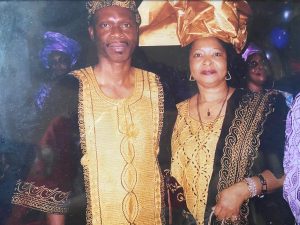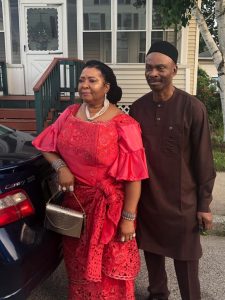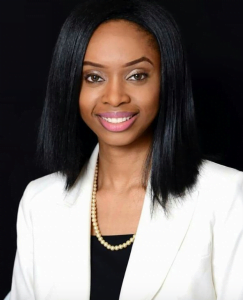Laura Onyeneho had always thought of herself as a lawyer and was prepared to pursue that noble profession. But that was before she fell in love with the microphone. She has been on an incredible romantic journey ever since. Today Laura has become a well-respected multimedia producer, an emcee extraordinaire and an amazing journalist. NPM took an excursion into Laura’s mind in this heart-warming interview. Enjoy!
NPM: Laura, Thank you very much for joining us this morning. We have been waiting for this interview for a while and are glad you could make it.
ONYENEHO: Thank you very much for having me.
NPM: Let me share a little bit about Nigerian Parents Magazine. Here is what we are trying to do. We look around in the United States and we see a lot of second-generation Nigerian-American children like you (We use that word “children” loosely, because you are all young adults now), doing extraordinary things. We’ve talked to so many different people in your category, your generation, really high fliers who are doing some great things. But your stories are not being told. And so, we are trying to bridge a gap here. We’re trying to celebrate you guys by telling your stories, but also use that as an opportunity to provide some incentive, almost like a catalyst, in terms of getting all the other younger people to emulate what you’re doing, to follow in your footsteps and to inspire them to do great things like you’re doing as well. In addition, we want other Nigerian parents to learn from the things that your parents did that are working, and just collaborate with them to help raise awesome Nigerian young men or women. So that’s a lengthy introduction of Nigerian Parents magazine and what we do. Now, your last name is Onyeneho. That’s an Igbo name. Do you have a middle name that is also Igbo?
ONYENEHO: I do have a middle name. My middle name is Ifeoma.

NPM: I am guessing you know what that means.
ONYENEHO: Yes, it means “a good thing.
NPM: So tell us more about your childhood, your parents. What was it like growing up in a Nigerian family in the United States?
ONYENEHO: Oh well, for me, my experience… I had a very normal childhood. My parents worked very very hard to make sure that none of my siblings ever lacked. My parents? I would describe them as laid-back disciplinarians. They aren’t the ones that talked too much, but when they do you know, you’re looking for trouble.
So when they know they give you the look or when they have a face of concernment and then you know, okay, let me calm down. So, they’ve never been the ones to talk too much. But you already knew if you were causing any trouble, or you saw any face of concernment that, okay, let me fall back. Let me relax. And I knew growing up I was a very stubborn child. I still am. But I use it to my advantage, especially in the line of work that I do. But I always meant well, I’m lucky to have the best of both worlds growing up here, being raised by two Nigerian parents.
I know often the fear, particularly for my father’s, is children losing sight of who they are and where they come from, because we’re born and raised here in the US. And we are surrounded by a lot of influences. And it’s easy that you can forget where you come from, where your roots are. And so they have done their best to show us the way. They tried to get us involved with a lot of cultural groups of young professionals, and tried to encourage us to network with others like ourselves. And they always remind us, even though we’re all well-educated, the one thing I appreciate about them is that they might have their own preferences of what they want their children to be, but they never imposed anything on us. They’ve always encouraged us to follow our own path. And they’ve always supported our decisions, as long as we had a solid plan. So, I don’t know how other African parents. Sometimes I usually would hear the stories of, oh, my parents want me to be a doctor or an engineer or a nurse. I took a different route, even though my route was to be an attorney. But that’s another story. We can go on to talk about that. But yeah, they’ve always supported my decision. And they’ve never told me, oh, I couldn’t do this, or I couldn’t do that. They’ve always been supportive. So that’s just how my upbringing was growing up.
NPM: Nigerian parents have a unique style in terms of raising their children. There is always a little bit of conflict here and there. Daddy, can I go sleep over at my friend’s house? And I think you know the answer to that already. Nigerian kids get used to stuff like that. You get used to: “this is what mom has made” or “this is what dad has made and that is what you are going to eat”. Stuff like that. So tell us what you like about our style and what you do not like, because there must be things that drive you crazy in our style.
ONYENEHO: Yes, I can’t speak for all parents. But I can say that the old school generation or the generation before us, I feel like they have to learn how to be more open-minded to the way of life that millennials are choosing to live. These days, people like myself and other people in my age group, we’re learning to explore. We’re hustling and we’re building. We’re trying to build solid foundations for ourselves. And the way we’re doing it isn’t the way that you guys are used to, from your time. I know from the stories I’ve heard in the past, they say, Okay, I came to the country. I worked hard. I got a job. They did the needful to make sure the families were provided for. And then from there, get married and you retire and you live happily ever after. And for us, we think very, very differently in this day and age. So the way we try to go about getting… enjoying the fruits of our labor isn’t what a typical Nigerian parent is used to or would consider.

So we’re trying to… we try to work smarter, not harder. We appreciate what the past generations have done. We really observe the way you all work and we’re just like, okay, we can take the work ethic, but there are just some things that we would like to change. When we’re trying to set the foundations for our lives. And that’s what I want more Nigerian parents to consider, that they might not be the way that you like. But you just need to give it a try and just give it a chance to see where your children are coming from.
Our generation is more in tune, especially in this day and age, we’re more in tune with our emotional and mental health. We don’t see a problem in communicating our problems, say, to a professional counselor or a therapist. It’s an idea that seems… it’s seen in a very negative context, when you think of mental health and problems and things of that sort. I can’t speak for everyone but seeking a professional counselor or seeking help whenever you’re stressed or you have anxiety, I see it as just like going to the doctor for a checkup. You’re also checking what’s going on emotionally. You are checking what’s going on with your health. I just see it as another thing that people should consider, especially in our community. We’re often stressed. We work so hard. We are taking care of families. We’re taking care of everybody. And we’re not doing enough to take care of ourselves when we are winded and exhausted. And it’s like, who are we? Who do we go to talk to when we’re exhausted, when we’re tired? And so, I want more parents to be able to do that, because we’re always seeing our parents as very strong people. They always have to be tough, because the world is very hard out there. And they want to reflect that upon their kids. And sometimes kids just want to… like you know what? I want to be able to express myself. I’m not always strong, but you know, I want you to be able to be comfortable to tell my parents, hey, I’m struggling, without having to feel the backlash. You know, so I noticed that with some Nigerian parents, emotional intelligence is lacking. That’s one thing. I wish there were more Nigerian parents to understand emotional intelligence.
Like I said before, a Nigerian parent goes through a lot, they’ve gone through a lot in their past. And so it’s just… to be able to communicate that it’s very, very important. Because you know, you can train your children as you wish, but they’re going to go out into the real world and you can only pray that when they go out there, they’re learning. They’re learning to be decent human beings outside and to be able to communicate themselves and not go into the wrong hands. And so emotional emotional intelligence is very, very important so that you will not be in a position where your children are drifting away from you. But those are just some of the things I… I don’t say I hate, but I feel like there is room for improvement, if I’m making any sense.
 NPM: Laura, you are going to an area where others have not gone before, mental health. So, what you are telling us in a nutshell is, “come on, guys. You gotta lighten up” Right?
NPM: Laura, you are going to an area where others have not gone before, mental health. So, what you are telling us in a nutshell is, “come on, guys. You gotta lighten up” Right?
ONYENEHO: (Laugh) The second part of the question that you asked is what I like. And one of the things I like about Nigerian parents, at least from what I’ve been able to observe growing up, is how they stand and they work as a unit together in front of their children. So I remember back in the day when none of my siblings could get away with anything, because both of my parents stood their ground together. And never got away with anything. So I would be like, “Daddy, can I go out?” And my dad would say, “No, you’re not going here”. And so I went to my mom and asked her: “Hey, can I go here?” My mom would say, “so what did your dad say?” I would say “Daddy said, No”. And she said, “Well, that’s your answer”. And I’m just like, ah. And so even though it was annoying me growing up, because I’m just like, I could never get away with anything, but I saw… And being able to do that as a unit, to be able to work together as a unit as a team. And so, now that I’m older, I’m like, “Oh, okay, I get it. I get it”. And I know why they said no back then. And so I appreciate that kind of energy that they bring. Because you know, sometimes when you’re not communicating and you know, one person says yes, the other person says no, and undermines the other person and then you have these problems. And so, growing up I always saw that unit, saw them together, doing that. And so I mean, that’s what I appreciate about Nigerian parents.
NPM: All right, so let’s switch gears a little bit and talk about your professional life for a second. Tell us a little bit about your training. We know you went to Curry College. You got a degree in political science and history and a minor in communication. You went ahead and got a master’s degree in broadcasting and journalism from Emerson. What spurred you into this area of work? Tell us about that and why you went to that area and how you’re using all that education?
ONYENEHO: Yeah. So when I entered college, my goal was to graduate and enter into law school to be a civil rights attorney. So that was my goal for a very long time as a child all the way up until I entered college. I knew what I wanted to do. Nobody could tell me anything. My parents didn’t have any decision making process into what I wanted to do, because I already knew that that was what I was destined to do at the time. So journalism was not in the picture. So it wasn’t until I returned from my academic studies abroad in France, and that was around 2010, 2011, I started to have second thoughts about making a career change. There was so much happening politically at the time. And I was studying language and Franco and United States Relations at the time over there. And over there, there was so much going on at the time.
I came in contact with many Africans who had a lot of stories to tell. And it was, honestly, another side of Paris that I was not used to seeing when I was watching things on TV about the country, or I was reading things about France. It was very different. So I said to myself, I really felt some… some responsibility. They were just very comfortable with talking about the experience there. And I was just like, I didn’t know how to help or what have you. By the time I came back, I just said, the next best thing to do was maybe I should pursue journalism. I still had much of the writing research to public speaking, the reading that attracted me to law. So I said that was the next best thing that I felt like I should do with that.
So after I graduated from Curry in 2012, from there I had to create a plan to position myself for my journalism career because I didn’t have a lot of experience in college at the time, because as I said before, my focus was law. I’d already taken my law… a law entrance exam. I’d already been looking for schools at that time. And I stopped everything because I wanted to pursue journalism. So I had to create a plan and then tell my Nigerian parents what my plan was. And they were shocked. So, they said, “where did this all come from? Because this is not what you were talking about when you were in school”. And I said, I know. I had a change of heart and so just know. Don’t be worried about it. I have a plan. I know what to do. And they just… they supported it. Because all they could think about was, okay, CNN. They watch CNN, they see other reporters, you see that like, Okay, my daughter can do that. So you can go and do it. Just have a plan. And I did.

And so I just feel like storytelling is impactful. If you do it right. People will watch and listen and they’ll be compelled to do something. And now more than ever, people see the value in storytelling. You see all over social media, even the work that you guys are doing now, you see the value in storytelling, and you see it in brand marketing, etc. So I like what I’m doing because I see impact, and I’m going to continue to do it. So I’ve been doing it for a little over four years now.
NPM: Four years! Seems to me, you’ve achieved things that people who have been in this field for many years could not achieve. For example, not too long ago, the Boston Herald reported that you traveled to Nigeria to work on sustainable development projects in local communities. Can you tell us a little about that?
ONYENEHO: Right. So, I didn’t travel to Nigeria to work on a sustainable development project. Rather, I went to partake in the holiday activities, and one of them happened to be my news assignment. The Boston Herald, they were aware that I traveled to Nigeria. And so I wanted to let them know that I will be traveling. And so they were very, very excited about my travels. And so they asked whether there would be any important news that would be important for our readers and our viewers to consider. And I said, of course. And it was a great opportunity for me to focus on what people in our communities are doing. And I said, since I’m in Nigeria, this would be a great opportunity to show them what people are really doing. And so I decided to highlight a nonprofit organization, Umu Igbo Unite. And they were wonderful for organizing these sustainable businesses. And this was a good opportunity for me to educate others on Nigeria, particularly Igbo people.
Nigeria’s representation in the mainstream media hasn’t been the best. So instead, I focused on those who weren’t complaining about the problems, but rather working to find solutions. And so I’m proud of the piece considering I only arrived with my phone camera. And my little notebook, I didn’t have big equipment to carry with me or anything like that. And I only had a few days to gather people to do interviews on a tight schedule. And I was there for only two weeks. And I have immense respect for international journalists who actually do this full time for a living in other countries because it’s very, not easy. It’s not easy to not have a lot of access. And if you’re, if you’re lacking in the language department, to be able to trust people in your environment and make sure you get this work done on deadline. So even in my experience, it was quite stressful, but I managed to get things done.
I and I’ve always wanted to have my career intertwined with my love for travel. And this was just one of the many opportunities to do so. So, I’m very, very excited that there was a good response from Nigerians. I received good feedback. And it’s not easy to please Nigerians. So when you hear good news like this, I consider it to be a big deal. All I could do was hold my chest and just hope. They published it… whenever they published it that month, in February, and was just waiting for feedback, negative or positive. And I’ve just been hearing good responses that they’ve learned something from it outside of what they typically would hear about Nigerians that are negative. So I was happy. And I thank everyone who took part in the piece.
 NPM: We were on Narcity. Our research about you sent us to that website. There was a phrase they used to describe you – Boss Editor. Is that a fancy way of saying Editor-in-Chief? What does that mean?
NPM: We were on Narcity. Our research about you sent us to that website. There was a phrase they used to describe you – Boss Editor. Is that a fancy way of saying Editor-in-Chief? What does that mean?
ONYENEHO: Oh, no. So, at the time, I was a Digital Editor for a startup black women’s lifestyle publication. They happen to name that title… they gave that managerial title to myself. So, that’s why they called it that. And that was around 2017. And, and I know you, you people have mentioned that. I have to focus on underrepresented communities.
NPM:That was going to be our next question.
ONYENEHO: Okay, yes. Being in this news industry is not easy. We’re in the era of fake news. People have shown great concern about my safety, especially in the industry that I’m in. I am black, and I’m a woman. And there aren’t many rooms where you see many of us, especially in this news industry. So I do want to push those underrepresented stories. Yes, especially in a city like Boston, where many have debated how the faces of news do not match the demographics of the city that they cover.
So rejection is just one of the biggest obstacles that I have had to face throughout my career. And I’ve had story ideas that have been rejected, and it’s frustrating. But it’s part of the job. And for me, if I really believe in a subject matter, I’ll continue to push it until I get my yes. And that is part of the job, like you can’t allow things to deter you. And rejection is just a part of it. You’re going to get many no’s before you get a yes. And so I’ve had my share. But it’s okay. At the end. It’s always worked in my favor. I’ve done the best I can with the platforms that I’ve been able to have and the titles that I’ve been able to earn.
NPM: You mentioned four years. You’ve been working as a journalist for four years, which is amazing given that if you went on the internet, Laura Onyeneho is everywhere. It feels like you’ve been working on this for a lifetime. You got all these awards and the 2015 Victoria Snellgrove Award for journalism, ethics. You got the emerging journalists fellowship award and all sorts of awards. Now what have you done in your professional life that you’re most proud of and. Which of these awards mean more to you?
ONYENEHO: I’m proud of all the stories I’ve done thus far. I’m proud of all my accomplishments. They might not be a big deal to anyone else. But they matter a lot to me because I know where I started from, because when I started, I didn’t have a strong foundation. I really had to hustle my way into just getting into the door period. I just see as… as stepping stones to something bigger for me. And so as long as someone watches or reads my work or learns something, or is compelled to do something meaningful because of my work, then I’ve done my job. And so I just… I can’t really pick or choose which one was the best, which one of my work is the best work that I’ve ever done because I just feel like these are all things that will turn into something bigger than myself. And, it’s a good question but I don’t have a general response for it. But I’m happy with everything that I’ve done.
 NPM: We cannot wait for that Pulitzer Prize to arrive. You are going to get there. So a lot of what you’ve done in your young age is nothing short of amazing. In four years, you’ve got all these awards and we see you getting even more in the coming years. But it takes a lot of discipline and dedication. So how did you develop such discipline and work ethic?
NPM: We cannot wait for that Pulitzer Prize to arrive. You are going to get there. So a lot of what you’ve done in your young age is nothing short of amazing. In four years, you’ve got all these awards and we see you getting even more in the coming years. But it takes a lot of discipline and dedication. So how did you develop such discipline and work ethic?
ONYENEHO: I credit my discipline to my parents, of course. What I noticed growing up was that even when there was a problem, my parents sorted it out amongst themselves and they made sure all of my siblings didn’t have to worry about it. They made things look very easy when we knew it wasn’t. And so they’ve always reminded me that even though education is very important it is, we have to always use our sixth sense. They always say it is the sixth sense or your common sense that would take you far in life. They talked about the importance of strategic planning, being assertive, knowing what you want, and executing things in a timely fashion, timely being the operative word because we always like to do things, not on time. And so they are the ones who are always on top of everything with everything. And so I just apply that to my work, especially as I continue to build my emcee and event hosting service along with my journalism work. And so I just take their work ethic and apply it to what I have been able to do and it’s been to my favor thus far.
NPM: Let’s talk about some of this work that you’ve been doing, especially around human rights. It is said that you’re using journalism to spotlight human rights and other issues in underserved communities. And I think you’ve already touched on the concerns and some of the challenges that lay in that area. But can you expand a little bit about, specifically what you’re doing in those areas, and how are you using this wonderful career of yours to help?
ONYENEHO: Yeah, like I explained previously about my time in Nigeria. If you have the platform or if you have the resources to shed light on an issue, or find a solution to a problem, then by all means, you have to take the leap and make things happen. I could have gone to Nigeria and come back. I didn’t have to do the story. I took the initiative to convince my editors and tell them why it’s important for them to consider publishing a story like this, publishing a video piece like this. And so, like I said, that story would have never happened, had I not just taken an initiative. And so if you have the platform, if you’re in that space, you should be able to think of ways in which you can help.
It’s important to take control of our narrative. So many other people are telling our stories. And it makes no sense to me. In a lot of the stuff that you read, people are misinformed. There are fallacies. And it’s important for us to be able to take the reins on that and be able to stay grounded and connect with people and network with them. Because there’s only so much people can read from the byline. But it’s doing things like this, going out there and showing your face and letting people know I’m here, this is what I’m doing, and just just to be reachable, so that things like this can be possible. If I wasn’t reachable, this would have never happened. And now people are recognizing like, okay, wow, we have somebody in this space that we can reach out to if there’s a concern in the community, if there’s something, a story idea that I’m not catching. They reach out to me and say, hey, we have somebody in this space. And so that’s why I am doing this. This work isn’t meant for me to be sitting behind a desk and typing behind a computer screen. I always have to be out there all the time for this to happen, for it to work.
NPM: We are in a very difficult and unprecedented time right now in the world. It’s not just in the United States. We have this pandemic – COVID-19 – that the world is grappling with. And I was doing my research and I stumbled on something you wrote, I believe it was in 2014, about the Ebola crisis, and you wrote about Omar Sharif of Guinea, and what she was doing. And now you’ve written a lot about governor Baker and his efforts to combat this dreaded disease. So let me ask you your perspective on what’s going on here, especially around leadership at the federal level or the state level. How do you feel the leaders are handling this? And they’re doing a good job? You know, what’s your perspective? What should be done?
ONYENEHO: I can only give the perspective of what the reports are saying. With the increase in the number of cases that have been happening in Massachusetts, I feel like the stay at home advisory that our state government is giving us is … we really need to take that seriously. Our health and our people’s lives are at risk, and people are in danger of catching this virus. And if we don’t take heed of the recommendations and advice given to our state, we can be put in harm’s way. It’s best to follow the recommendations of the Center for Disease Control and protection and to verify the type of information you choose to digest, because whether we like it or not, there’s a lot of misinformation going around that is adding to the anxiety and frustration.
I’m in the news business. So we do our best to make sure we’re giving you what the state is telling us. We’re verifying that information as well as what is going on nationally. But then we’re not the only ones giving out the stories. There are other entities, other news organizations that are also doing the same. And a lot of people put the blame on us because it’s like you told us this. But it’s like the consumers are also responsible for going out there and doing their own research as well, to make sure that we can reduce the anxiety that’s happening, and the overall pandemic of people running around, and all these things. So, I just tell people, I say make sure you watch what you digest. And make sure you follow the recommendations of people who are in those organizations that are actually verified. CDC is one of the places where I tell people all the time to go. Read what they’re telling you. Follow the directions and make sure you’re taking care of yourself and your family.
NPM: We interviewed Kwame Onwachi. Have you heard about him?
ONYENEHO: Yes, I believe I read something on your website about this young man.
NPM: He has an upscale restaurant in DC. He invited us to his restaurant. Senators go there. Obama goes there. And it is this beautiful restaurant that he put up in DC. Upscale. And he only serves Nigerian dishes. Unbelievable goat meat, jollof rice and all kinds of Nigerian dishes. So, we were just wondering. What is your favorite Nigerian dish?
ONYENEHO: I have multiple favorites. One of my favorite dishes is hot fish pepper soup with yam. Yam porridge. I love vegetable stew. But I’m not a big fan of moimoi. And a lot of people are like, oh, are you kidding me? Why? But yeah. My family encourages me to eat because I’m small in stature. So they’re always encouraging me to eat, eat, eat. Even at home in Nigeria it is the same thing. And so I do. I don’t have a favorite. I have multiple favorites. I love our food.
NPM: One of the reasons we’re doing this interview, like I said at the beginning is we want people to look at people like you, we want the young ones to look at people like you and aspire to be like you. You are a success story, but it’s not a bed of roses. The world is not a bed of roses. So you have had some challenges of your own. Glad you touched on some of them already about being a black woman trying to do something great in this business. But speak to our younger people who are coming up about some of the challenges, how you overcome them and how you continue to move forward and do what you do. Give them some nuggets of wisdom.
ONYENEHO: Yeah, my journey, of course, wasn’t a bed of roses. But one of the things that is assumed is that once you are in the news business, once you are in the media, that you make tons of money when you are starting off. And that is not the case, especially if you are young and you are coming out of school.
I remember why I first considered this journey into news, and how I didn’t have a strong portfolio of work. So, I had to freelance for little to no money while working other day jobs to qualify for the job I wanted at the time. This was in the beginning when I decided that I was going to switch from law to journalism. So, I didn’t have a strong portfolio. I knew I could write very well but it was, okay, how do I get my foot into where I needed to be? So, I had to work for little to no money while working on the day jobs. And people were just like, are you kidding me? And this isn’t the struggle many Nigerian parents want for their children, but it is the reality, whether you like it or not.
Nothing will come easy, especially if you are coming into a competitive field. And you are probably going to have to work a side job until you make a comfortable salary. And even then, in this day and age, not having multiple streams of income is very risky. So, that’s why I have to look at my other gifts and talents and expand on them. So, I had people encourage me to focus on emceeing, because I did it as a hobby before. And they were like do you do this professionally? I said no. They were like, I think you should consider it because you have a gift. And so, I tapped into the gift and it has been working for me ever since. And so, that is what I use as a multiple stream.
Journalism is a very competitive industry. So, you are going to hear a lot of no’s before you get a yes. Even before I got accepted to work for The Herald, I was hearing no’s, no’s no’s. But in-between those no’s, I tell people, what are you doing when you are getting rejected. What are you doing in-between time so you can prepare for your yes? So, if I wasn’t doing all those things and preparing the freelance work and everything like that, The Boston Herald wouldn’t have hired me. But they saw the effort I was making during those times that I was looking for my next career move.
So, I tell people, I find myself overworking, I was growing impatient with my process in getting to the next phase of my career while also trying to build something for myself. And so, to reduce my stress, I also had to try to work on my sleeping. Because you are always up and you are always moving, sleep is one of the last priorities on your mind throughout the day. I tried to read, to do non-work-related travel, and do a lot of things that involve self-care.
One advice I would like to give to young people who would consider this avenue or this profession is to ask for help. Not that I didn’t ask for help but there are going to be times when you are going to be disappointed in where you are. You are going to look at other people and think, wow, other people are moving faster than me. I am sitting here looking at myself and thinking, ok, why ain’t I up there with them? Your pride is going to get in the way of asking for help. So, there are going to be things that are not going to be in your control whether you like it or not. And there are going to be people who are going to know more than you that can help you. So the worst they are going to tell you is no. But so what? You are not going to die. So, to get to the next level, you are never going to be alone. There is always going to be somebody who can help you get there. And you can’t get there alone. So, it will get very hard.
People are trying to find ways to get into the business. People don’t even go to school for journalism anymore. They have the podcast. They have social media. If they want to tell their own story, they can tell their own story and get that job before you can. So, you just have to be consistent. You are always learning. Even though you have a degree, I am still taking classes online. I am still learning the new tools, new digital tools that will take me further. You are always going to be a learner whether you like it or not. So, there are things people have to consider while you are facing challenges in this industry.
NPM: If the opportunity comes, would you want to mentor some of these Nigerian kids who are looking up to you saying, I want to do what Laura is doing. Would you be that person to coach them and help them avoid the pitfalls they could encounter on their way?
ONYENEHO: Yes, I currently do that now. There are a few international Nigerian students that have reached out to me in the last couple of years, that have also expressed their feeling of being left out and their feeling of watching other people like themselves who are in this thing. I felt that same way too. I am not an international student but I am Nigerian and a lot of people that I knew are not in the same fields. They are engineers. They are doctors. They are nurses. So, they are not going to relate to what I relate to professionally because I don’t know what they are talking about. I am not in their world. I am not in healthcare. For those who choose to be on this route, I am there for full support because I know what it felt like when I didn’t know who to talk to. There are not a lot of people in my field. There are not a lot of people who do what I am doing. So, I try my best to mingle and intertwine with those that do. And those who are coming up, I am always there to support because I definitely know how it is to feel lost. You don’t know what to do and where to go, especially if you are an international student from Nigeria. There is another battle that you have to deal with.
NPM: Laura, this has been wonderful. Is there anything else you would like to share with our audience about the great emcee, the great video content producer, the great Laura Onyeneho?
 ONYENEHO: For me, I have not talked much about my work as an emcee. I was introduced to this work while I was in college. I have done it part-time while pursuing my education. So, I have just decided to put more energy into it because of the response that I was getting from the community. Very often, I hear people telling me that, oh, we don’t see a lot of young Nigerian girls that are doing this thing that you are doing. It is mostly the guys that are doing it. We don’t see young women like you doing it. And I am shocked when they say this because there are a lot of girls out here who are doing this. Maybe not in Massachusetts because it is a small group of us. But we do this. We do this a lot. So, I do this because I want to push other young women to feel comfortable doing this because I am surrounded by men all the time.
ONYENEHO: For me, I have not talked much about my work as an emcee. I was introduced to this work while I was in college. I have done it part-time while pursuing my education. So, I have just decided to put more energy into it because of the response that I was getting from the community. Very often, I hear people telling me that, oh, we don’t see a lot of young Nigerian girls that are doing this thing that you are doing. It is mostly the guys that are doing it. We don’t see young women like you doing it. And I am shocked when they say this because there are a lot of girls out here who are doing this. Maybe not in Massachusetts because it is a small group of us. But we do this. We do this a lot. So, I do this because I want to push other young women to feel comfortable doing this because I am surrounded by men all the time.
When I am booking clients and booking gigs, they always test my ability because they are not used to seeing a young woman doing this. But they don’t put the same energy into a young man doing it because that is what they are used to. And so, that is one of the challenges I know as an emcee that I have had to deal with, especially in my community. I don’t take it personally. I know what I am doing and my work will speak for itself eventually. So, I just want to let people know they should stay tuned because they will see me on many more stages in the upcoming months. And this will be after Corona is over. (Laugh).
NPM: Laura, before we wrap up, we would be remiss if we did not do some Laura trivia here. What is your favorite Nigerian snack?
ONYENEHO: My favorite Nigerian snack is suya. Is that even a snack?
NPM: That’s a good one. How about your favorite movie? It does not have to be a Nigerian movie.
ONYENEHO: My favorite movie of all time would be Malcom X. I know it is a long movie but I think it is fabulous.
NPM: What is the best place you ever visited in Nigeria?
ONYENEHO: The best place I have ever visited in Nigeria is Owerri. Owerri is very nice because I feel like it is an epicenter of enjoyment. I go there. The hospitality industry is booming there. I see a lot of young people going there, spending their money and growing the economy. Owerri is doing great. The last time I was there, I enjoyed myself. So, I feel like I have to do one for the team because Imo State is my state and Owerri is a nice place that I visited this past visit.
NPM: Laura, we just want to thank you for taking the time to share about your life with us and talk to us about all the great things you are doing. We look forward to more great things happening for you.
ONYENEHO: Thank you so much. I appreciate you all.


